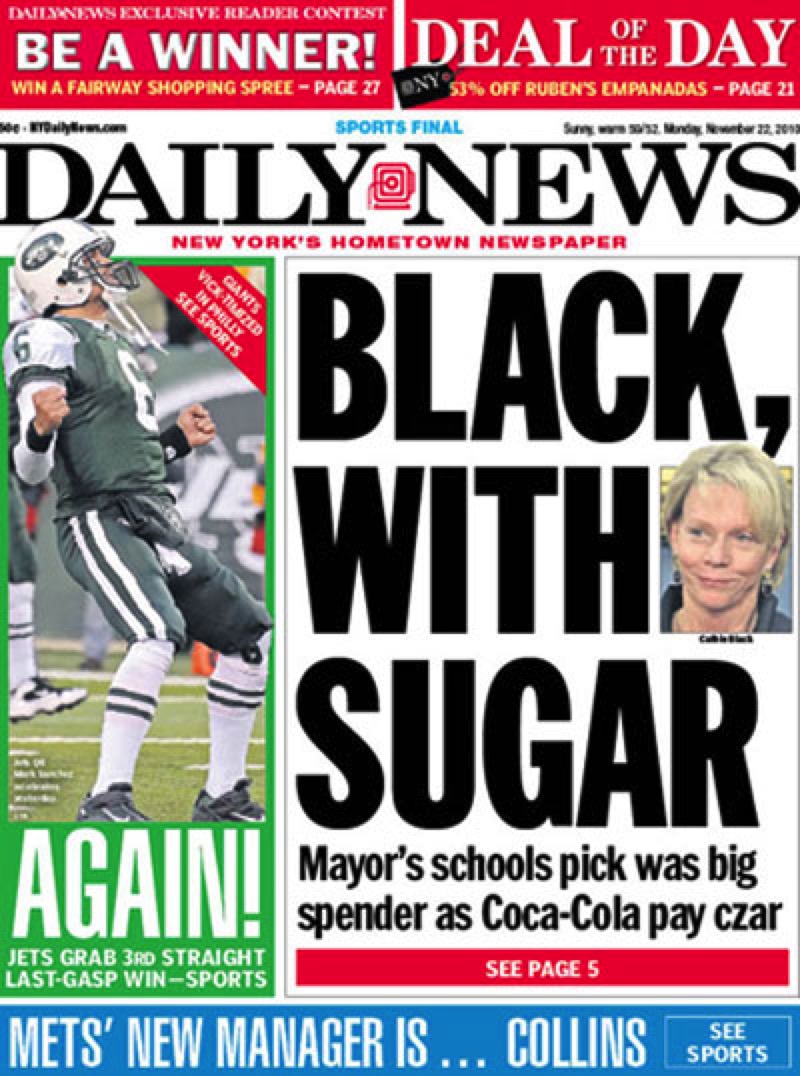Cathie Black, as executive pay czar at Coca-Cola, approved hefty perks, compensation for execs
BY DOUGLAS FEIDEN | DAILY NEWS STAFF WRITER | Monday, November 22nd 2010
Read Original

Cathie Black earns $195,000 from her part-time gig on Coca-Cola's board of directors, as well as another $300,000 serving on IBM's board, in addition to hear Hearst salary.
As longtime executive pay czar at Coca-Cola, Cathie Black rarely met a perk she didn't like or a hefty compensation package she didn't approve.
Those free-spending ways could be a detriment for the would-be schools boss in a system where her patron, Mayor Bloomberg, just ordered up 4,300 teacher layoffs.
For 17 years, Black has been a well-paid member of Coke's board of directors, a tenure watchdog groups consider too long.
In the past nine years, she has run the board's Compensation Committee, which has awarded what many critics dubbed outsize pay, profligate perks and golden parachutes.
Bloomberg brands her a "visionary" and "business pioneer," but union critics and shareholder activists say Coke's lackluster performance compared with rivals in the past three years doesn't justify the pay levels approved on her watch.
"Cathie Black had the highest level of responsibility for making responsible compensation recommendations to Coke's board," said Brandon Rees, deputy director of the AFL-CIO's Office of Investment. "She failed to take advantage of it."
Black pulls down $195,000 annually for a part-time post on the Coke board, as well as an additional $300,000 a year for a part-time gig on the IBM board. Her big-bucks salary from Hearst Magazines isn't made public.
The world's largest maker of fizzy drinks pays CEO Muhtar Kent $18.8 million - including $659,000 in perks for jets, chauffeurs, insurance, "security monitoring" at home and financial planning to help with his taxes.
GETTING A GRADE OF F
Black championed some of those sweeteners in a July 2008 letter to Kent: "You are required ... to travel exclusively on company aircraft both for business and personal travel ...
"It is also appropriate that your spouse and immediate family travel on company aircraft when accompanying you."
Eight months later, the Corporate Library, a research firm that ranks board performance and executive pay, lowered its rating on Coke from a D to an F.
Corporate Library criticized the "entrenched" nature of Coke's board, noting that seven of 14 board members, including Black, logged more than 15 years.
"All this raises concerns about board entrenchment, independence and commitment," the firm wrote, blasting the board without criticizing Black by name.
A Coke spokesman declined to comment. Kent cited Black's "invaluable years of service" and her "thoughtful and wise voice" when she quit the Coke board Nov. 15 to avoid conflicts of interest if she becomes chancellor.
Hearst didn't return calls; the Department of Education and City Hall declined to comment.
Black's record at Coke shows she and her board approved other controversial pay policies:
At least 55 American companies, including Verizon and Goldman Sachs, have adopted "Say on Pay" proposals giving shareholders a nonbinding annual vote on executive pay. Coke has rebuffed such a reform for four years.
"They keep saying, 'No!'" said Sister Susan Mika, director of corporate responsibility with the Benedictine Sisters of San Antonio, which owns 500 Coke shares and is lead sponsor of the Say on Pay resolution.
Lavish golden parachutes went to short-term or weak bosses. Ex-CEO Douglas Daft got $36 million after three years in the job; ex-President Steven Heyer, passed over for the top slot, left with $24 million.
"They keep rewarding one poorly performing executive after another on their way out," said Carin Zelenko, head of capital strategies at the International Brotherhood of Teamsters.
dfeiden@nydailynews.com
FAIR USE NOTICE. This document contains copyrighted material whose use has not been specifically authorized by the copyright owner. The Campaign to Stop Killer Coke is making this article available in our efforts to advance the understanding of corporate accountability, human rights, labor rights, social and environmental justice issues. We believe that this constitutes a 'fair use' of the copyrighted material as provided for in section 107 of the U.S. Copyright Law. If you wish to use this copyrighted material for purposes of your own that go beyond 'fair use,' you must obtain permission from the copyright owner.











